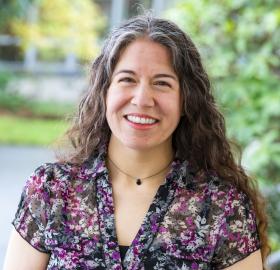Brandilynn Villarreal
Associate Professor
Dr. Villarreal is a lifespan developmental psychologist with a focus on motivation and self-regulation. In particular, she studies adolescents and young adults in the transition to adulthood and higher education. Dr. Villarreal received an undergraduate degree in Psychology and minor in Women’s Studies from the University of California, Los Angeles (UCLA; B.A. 2006) and a master’s degree in Clinical Psychology from California State University, Dominguez Hills (CSUDH; M.A. 2009). At CSUDH, Dr. Villarreal worked as the program coordinator for the Ronald E. McNair Post-baccalaureate Achievement Program. The McNair program provides first-generation, low-income, and underrepresented college students with extensive research experience and preparation for graduate school.
Dr. Villarreal completed her Ph.D. in Psychology at the University of California, Irvine (UCI; Ph.D. 2017) with an emphasis in developmental psychology and minors in quantitative and social psychology. While earning her Ph.D., Dr. Villarreal taught several courses at UCI and Irvine Valley College and extensively mentored undergraduate research projects and theses. She also served as a Pedagogical Fellow where she gained expertise in the scholarship of teaching and learning, effective teaching technologies, and strategies for maximizing student engagement.
Dr. Villarreal’s research aims to address the growing disconnect between youth’s expectations to attain higher education, on one hand, and their ability to realize these expectations on the other hand. Asian American and European American youth consistently enroll in college and attain educational degrees in greater proportions than Latinx, African American, and Native American youth, creating an achievement gap. Researchers and policy makers from all disciplines have attempted to close the achievement gap, yet one of the most effective and cost-efficient points of influence, psychological resources, is often neglected.
Dr. Villarreal’s research explores how motivational and self-regulation processes, like control perceptions, help adolescents and young adults stay engaged with their educational goals despite social, economic, and educational challenges. At Cal Poly Humboldt, she mentors undergraduate and graduate students, particularly students interested in motivation and the educational goals of students from diverse backgrounds.
Dr. Villarreal’s teaching is informed by research on motivation and the importance of perceived control in higher education. Many universities, including Cal Poly Humboldt, are now a majority of first-generation college students (i.e., neither parent graduated from a four-year college). In addition, more and more college students are from underrepresented backgrounds in academia (i.e., Latinx, African American, or Native American). Like many universities in California, Cal Poly Humboldt is a Hispanic-serving institution (HSI). First-generation and underrepresented students may perceive college as a low-control environment, especially when they encounter challenges or setbacks (e.g., students may not believe they have control over their course performance after a low exam score). However, college is a high-control environment where effort, energy, time, and persistence result in improved performance. In her classes, Dr. Villarreal emphasizes that students have substantial control over course outcomes, both through the effort and time they invest in the course as well as the feedback they provide to improve the course.
Research demonstrates that everyone, but especially first-generation and underrepresented students, benefit from frequent, low-stakes testing in a format that is similar to high-stakes testing (i.e., midterm and final exam). Students should have the opportunity to assess their learning repeatedly in a way that does not negatively impact their overall grade. Last, research indicates that traditional lecture formats, which are common in universities, may be a disadvantage to women and underrepresented students. In her classes, Dr. Villarreal aims to serve as a facilitator of group discussions that value students’ lived experiences and ideas. She believes that an understanding of diverse experiences enriches everyone’s learning. Dr. Villarreal encourages her students to challenge their beliefs and deepen their learning with the ultimate goal of applying class concepts to their everyday lives and future professions.


